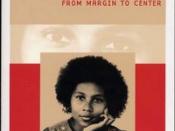For generations, the traditional role of women in society has almost entirely excluded them from participation in the workforce. Oppression against women, especially of colour, in the workforce is a serious issue in society. This issue began very long ago in history and sadly is still an issue in today. The rise of feminism, however, has impacted this issue greatly. Discrimination has been a serious part of this ongoing oppression in the workforce, and feminists strived to decrease the amount of it, and gain women more equal rights. Opportunities for women are slowly increasing, and discrimination is slowly decreasing. Still, however, women of colour are finding it very hard to find jobs. In an article selected from Ebony Journal, entitled "Black Women Doctors Take Center Stage," societal changes are reflected in relation to the recent, dramatic rise in women, especially of colour, in the medical field. The article outlines how both white and coloured women are overcoming past difficulties in the workforce and are striving in education and in their careers.
These past difficulties, which still exist today include racial and gender discrimination, sexual harassment, and pay differences. The article speaks of how women are no longer restricted to traditional careers, such as nursing, teaching and secretarial roles. Also, it speaks of how black women especially, are finally stepping to the forefront of certain professions like physicians and dentists. It is described in the article how discrimination in the past limited the number of black women in these traditionally male professions. Using the general feminist theory and Erving Goffman's dramaturgical theory, the problem of discrimination in the workforce will be assessed. The feminist theory very easily relates to this subject since feminism strives for equality, and is highly concerned with women's roles in labour. The dramaturgical theory will be...


